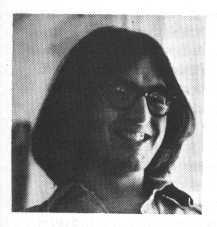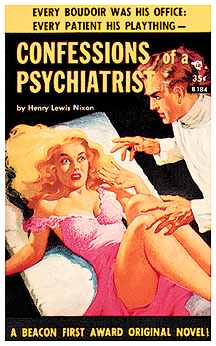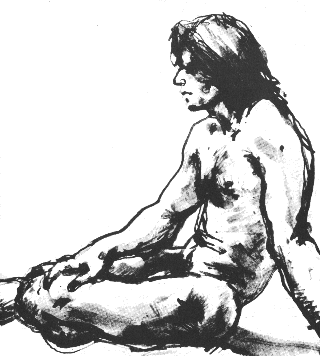|
|
The Ninth Street Center
Ninth Street Center Journal |

|
The View From The Center by Dean Hannotte |
The Menace of Psychiatry
Mainstream psychiatrists aren't only against homosexuals. They're against anyone who isn't potentially a good patient in their terms. and this may include anyone who thinks for himself, or who lives in an unconventional way, or who is willing to look at the psychiatrist as an equal. Often a psychiatrist's training will have reduced his emotional responses to a calculating diagnostic efficiency with very little real feeling left over. And of he has never been able to open up to important human questions in his own life, what he's calling therapy may boil down to a dishonest game to brainwash you into believing you're being helped.
 Let's look at the following statement, taken from Roche Laboratories' booklet Interviewing Techniques and quoted in a recent medical advertisement for Librium: "To establish a healthy therapeutic relationship and to help the patient ventilate his problems, an attitude of receptivity, of dynamic passivity, and been recommended, with the physician responsive but non-judgmental. This encourages the patient to speak freely, to present his difficulties as clearly as he can. The patient's distress is likely to be reduced if he is permitted to talk without interruption or criticism. Expressions of interest, without signs of emotional reaction from the physician, can help create the necessary therapeutic rapport."
Let's look at the following statement, taken from Roche Laboratories' booklet Interviewing Techniques and quoted in a recent medical advertisement for Librium: "To establish a healthy therapeutic relationship and to help the patient ventilate his problems, an attitude of receptivity, of dynamic passivity, and been recommended, with the physician responsive but non-judgmental. This encourages the patient to speak freely, to present his difficulties as clearly as he can. The patient's distress is likely to be reduced if he is permitted to talk without interruption or criticism. Expressions of interest, without signs of emotional reaction from the physician, can help create the necessary therapeutic rapport."
Notice the jargon: ventilate, non-judgmental, therapeutic rapport. Who was it who defined psychology as the science that talks about what everyone knows in terms that nobody can understand? This kind of over-elaboration of abstract categories serves to insulate the psychiatrist from the person he is supposed to be helping, sparing him the need for ordinary human compassion. Think twice about trusting anybody this cool to you. Notice the double-think: dynamic passivity. I suppose this might be almost as helpful to a troubled person as sublime apathy. No, I think apathy is less intrusive. Notice also the air of unseen absolute authority: "[it]...has been recommended." By whom? President Nixon? Charlie Chan? Rasputin, the Mad Monk? And note the contradictions in terms: responsive but non-judgmental, expressions of interest without signs of emotional reaction.
I've learned from my own counseling experiences that if you really expect to help the people you see you need to involve your critical faculties in a spirit of good will, not to prove how sick they are, but to get a feeling for how much healthier they can become. But a psychiatrist is usually so committed to his career image and social status that he is afraid to care, afraid to be honest, afraid to admit perhaps the failure of his own way of life. The very procedures of therapy can be designed to counter the threat of experiencing real warmth toward his patients. There is no way in this world to be interested in someone without having an inner emotional reaction to them, and this may be why the author recommended "expressions of interest."
There are probably many young psychiatrists who go into their profession hoping to find some way of serving mankind, only to come up against a rigid hierarchy of superiors out to cure them of their altruism and elevate them to a life of self-serving pretension based on exploiting the gullibility of laymen. I used to wonder why the suicide rate among psychiatrists is higher than in any other profession. I don't anymore.
Politics as Therapy
Liberation is a fundamentally political process. To get our heads together we must first attack the system that oppresses us, to revive those political instincts that have been repressed by our alienation from the mainstream of American life. If we must put off other, perhaps more creative, interests at this time, it is only to establish this base of political power and political consciousness which is necessary to protect us from the hostility of a straight world.
Does all that sound true? Well, it isn't. Politics is no cure for an empty life. Yes, politicians control political resources. Politicians seem to be at the helm of nations. But get beyond the practical realities of everyday existence and you see they don't control anything else. And they don't understand anything else, not the media, the arts, scientific inquiry or human development itself. When you face up to your personal failures you owe it to yourself to use honesty and insight to get at the truth, not movement propaganda. When you fall in love with someone, you leave Nixon out of it. And if you don't, that's not Nixon's fault.
I can understand why politics is such an impressive layer of reality. For one thing, we are all apostles of the six o'clock news. But the charisma of politics is very often the charisma of criminality. We wonder what they are going to try to get away with next. There is something exciting about the miraculous impunity of their ruthlessness. Apparently some of us in the gay movement would like to be just like them.
But politics isn't therapy. It can't make us grow. The political reforms are coming. We can work for and support them. But what's really going to make us happy is finding out what we have to give one another as people, as individuals. If I can brighten your life, or you can enrich mine, that's what counts. Carrying a lot of resentment around about a world we never made is only going to poison our chances of reaching out to each other with the best in us. Some people, I guess, see hatefulness as their way of getting even. But it's really a good way of getting sick. The only cure for hate is love, but to find people who are good for you to love is hard work, the kind of work we were never taught to expect in adult life. But let's face it, we were never taught very much about the real world anyway, so why get hung up in feeling worry for ourselves?
The trick is to insulate yourself psychologically from people who are bad for you, so that you can maintain a readiness to open up to the good people in your life. You really need it and so do they. Picking on people who can't join us in this human venture is like beating a dead horse. And let's stop trying to simplify love into some automatic, gooey sensitivity trip. Love is supposed to be good for the other person, and when it's not you know you're doing it wrong. We've got lots to learn, lots of inner battles to wage, but many rewards to gain and many things to be very, very proud of. I propose we leave politics out of it.
What is Flexibility?
So many of the goals that we human beings have seem to contradict themselves. Like strength and flexibility, for instance. It's very clear what we mean when we tell someone to be strong. It's very clear what we mean when we tell someone they should become more flexible. How do we combine the two?
It's a matter of emphasis and situation. When we feel weak, we make a special attempt to go with what we're sure of. When we see our rigidity offend people we care about, we try to shake loose preconceptions and programmed behavior that no longer relates. A practical situation that calls on us to deal with the world as it is is more likely to demand strength, so that we can come through it with our own values and sense of self intact. A creative and new setting challenges us to let go of ourselves and experiment a little.
I find myself rather fixed in my beliefs about life. Fortunately I have a lot of inner strength that carries me through a lot of false territory and has allowed me to live a rather stable life. When the opportunities came for learning more about the real world I was game, and slowly I've given up a lot of primitive attitudes towards the world and become much more healthy. One thing my lover, Paul, has taught me is that when you are committed to a creative life, you have to accept the sense of limbo that the growth phases bring. You always give up something when you get something new, and the transition is disorienting. Right now I'm trying to become more flexible, and believe me it's a lot easier to write about than do. What's helping me is the whole environment here at the Center. People are always giving me the benefit of a doubt. When I fail, they're ready to appreciate me for what I've already done. A lot of love comes through in all those hundreds of momentary exchanges that occur each month.

I guess flexibility is really believing that things can change, that the world is somehow different in each moment. It's seeing your personality as a variable that grows as you build a better life. Everyone who is not a complete failure in his personal life tends to overwork certain ideas or methods that have tended to produce the required results. Becoming flexible means learning to sense when you're pushing too hard, too fast. It means maintaining a trusting openness to a human world in which you realize that needs are satisfied in a great variety of ways.
This is very hard for some people to do. I'm thinking of some of my friends in the gay movement, and other movements as well, who surrender most of their identity to the charisma of the group and lose touch with this sense of being able to change their own lives. This concession to group purposes is not so different from the patriotic fervor that throws nations at each other's throats. People who are successful in any highly structured context often lose contact with their own humanity and grow quietly desperate with the passing of the years.
I guess I believe in failure in some sense, but not the sense in which Freud talked about the fear of success. I am not afraid of succeeding. I am afraid of feeling I have to succeed at anything in which I've already begun to lose interest. Many young people who look forward to success at, say, heterosexuality show signs of this very same fear. It is at that point that their elders admonish them to be strong and carry on the traditions of civilization. They told me that, over and over again. But I claim that that's the moment to be flexible, to not be afraid of letting go of the longed-for rewards of success. Life is really very good to people who let go in that way.
Gay Fun
I went to a dancing bar last night with some people from the Center and we stayed out till 3:30. It was my way of letting down and having fun, and I was careful not to infuse the experience with an intensity it did not require. That means I goofed off. And I danced. And I drank beer. And I exchanged semi-meaningful glances with people. I find I don't have much to say in such situations. All my social time these past few years has been taken up with talk groups and counseling. But it was good just being there, feeling the juices flow in the bodies next to me, hearing the laughter and soaking up the interest of strangers.
For what they are, I like the bars. I like the hustle and bustle, the sexy dancing, the joking, the smoke, the lights. I find the social accidents interesting, the way one person's role tweaks another's and makes them reach for a greater common experience. I was very aware of the variety of ways in which different people in different situations were trying to do well with where they were coming from and where they were going. I was the patience of the harassed bartender, the small groups ever ready to widen their circle, the conscientious dampening of racial resentments, the lonely ones willing to wait for real opportunity, and the sheer honest readiness for involvement that had brought all these people to one place.

I felt the web of individual lives crossing and crisscrossing, the prowling, restless needs swimming through the room. And I also sensed a general uneasiness underlying much of the incessant seeking after stimulation and sensation. There were the spent ones, looking washed out inside, numb, and guys whose expressions belied the fact that they had come back again only against their better judgment.
The moral of all this might have been sadness over the waste of all that human magnificence, but I don't really feel that way about it. We all go two steps forward and one step back, and you can't make a tragedy out of every third step. No, the point for me was just that I wanted to be there, sharing the fun, the mistakes, the smiles, the longing, everything. It made me feel there was work to be done.
-- reprinted from The Ninth Street Center Journal 2, 1974
[E:\DH\NSC\HTP\J2HANNO.HTP (46 lines) 1999-05-26 15:20 Dean Hannotte (DH)] | ||||||||